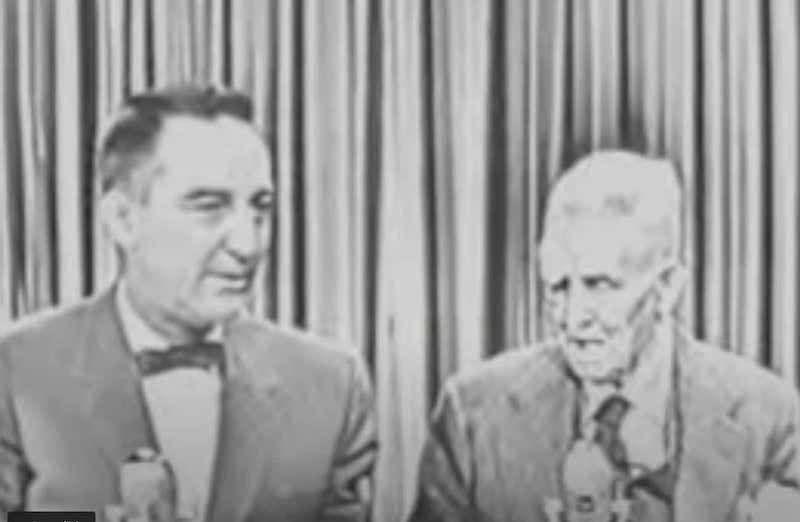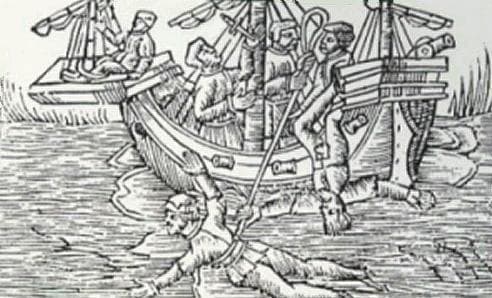-
Alfred Baeumler (1887–1968), German philosopher in Nazi Germany. He was a leading interpreter of Friedrich Nietzsche's philosophy as legitimizing Nazism. Thomas Mann read Baeumler's work on Nietzsche in the early 1930s, and characterized passages of it as "Hitler prophecy." (Philosophers and sociologists)
-
Alfred Rosenberg (1893–1946), considered one of the main authors of key Nazi ideological creeds, including the racial policy of Nazi Germany, antisemitism, Lebensraum, abrogation of the Treaty of Versailles, and opposition to degenerate art. He is also known for his rejection of Christianity, while playing a role in the development of Positive Christianity. At Nuremberg he was tried, sentenced to death, and executed by hanging as a war criminal. (Philosophers and sociologists)
-
Martin Heidegger (1889–1976), German philosopher who was politically involved with National Socialism. The relations between Martin Heidegger and Nazism remain controversial. He was a member of the Nazi party, he joined the NSDAP on May 1, 1933 three weeks after being appointed rector of the University of Freiburg. Heidegger resigned the rectorship one year later, in April 1934, but remained a member of the NSDAP until the end of World War II. His first act as rector was to eliminate all democratic structures, including those that had elected him rector. There were book burnings on his campus, though he successfully stopped some of them. There was also student violence. Although after the war he neither apologized nor publicly expressed regret for his involvement with his affiliation with Nazism, in private he called it "the biggest stupidity of his life" (die größte Dummheit seines Lebens). (Philosophers and sociologists)
-
Karl Haushofer(1869–1946) was a German general, professor, geographer, and politician. Through his student Rudolf Hess, Haushofer's ideas known as Geopolitiks influenced the development of Adolf Hitler's expansionist strategies. (Philosophers and sociologists)
-
Ernst Krieck (1882–1947), German pedagogue. (Philosophers and sociologists)
-
Herman Schmalenbach (1885–1950), who refined the concepts of Gemeinschaft and Bund. (Philosophers and sociologists)
-
Carl Schmitt (11 July 1888 – 7 April 1985) was a jurist, philosopher, political theorist, and professor of law. Schmitt joined the Nazi Party on 1 May 1933. He presented his theories as an ideological foundation of the Nazi dictatorship, and a justification of the "Führer" state with regard to legal philosophy, in particular through the concept of auctoritas. Nevertheless, in December 1936, the SS publication Das schwarze Korps accused Schmitt of being an opportunist, a Hegelian state thinker and basically a Catholic, and called his anti-semitism a mere pretense, citing earlier statements in which he criticized the Nazis' racial theories. After this, Schmitt resigned from his position as "Reichsfachgruppenleiter" (Reich Professional Group Leader), although he retained his post as a professor in Berlin, and his post as "Preußischer Staatsrat". Although Schmitt continued to be investigated into 1937, further reprisals were stopped by Göring. In 1945, Schmitt was captured by the American forces and released in 1946. Schmitt refused every attempt at de-nazification, which effectively barred him from positions in academia. (Philosophers and sociologists)
-
Hans Friedrich Karl Günther (1891–1968), German race researcher and eugenicist in the Weimar Republic and Nazi Germany, also known as "Rassengünther" (Race Günther) or "Rassenpapst" (Race Pope). He is considered to be a major influence on National Socialist racialist thought, and was a member of the Nazi Party. (Scientists and physicians)
-
Philipp Lenard (1862–1947), Nobel laureate and ideologue of the Deutsche Physik movement. (Scientists and physicians)
-
Alfred Ploetz (1860–1940), German physician, biologist, and eugenicist who introduced the concept of racial hygiene in Germany. He was a member of the Nazi party. His brother Ernst Rüdin, also a committed National Socialist, praised him in 1938 as a man who "by his meritorious services has helped to set up our Nazi ideology." (Scientists and physicians)
-
Johannes Stark (1874–1957), Nobel laureate and ideologue of the Deutsche Physik movement. (Scientists and physicians)
-
Otmar Freiherr von Verschuer (1896–1969), German human biologist and eugenicist primarily concerned with racial hygiene and twin research. (Scientists and physicians)
-
Eugen Fischer, German biologist, member of the Nazi Party, prominent in genetics and "racial hygiene". (Scientists and physicians)
-
Fritz Lenz, German geneticist, member of the Nazi Party, and influential specialist in "racial hygiene". (Scientists and physicians)
-
Karin Magnussen (Scientists and physicians)
-
Josef Mengele (Scientists and physicians)
-
Heinrich Gross (Scientists and physicians)
-
Ernst Bergmann (1881–1945), German philosopher who in his work, Die 25 Thesen der Deutschreligion (Twenty-five Points of the German Religion), held that the Old Testament and portions of the New Testament of the Bible were inaccurate. He claimed that Jesus was not a Jew and of Aryan origin, and that Adolf Hitler was the new messiah. (Theologians and spiritual leaders)
-
Savitri Devi, pseudonym of the Greek-French writer Maximiani Portas. A prominent proponent of animal rights, deep ecology and Nazism, who served the Axis cause during World War II by spying in India. (Theologians and spiritual leaders)
-
Ludwig Müller (1883–1945), was a theologian and church leader who played a major role in the Nazi party's attempt to misdirect the Protestant, mainly Lutheran churches of Germany toward a basis in Aryan ideology and away from its Jewish origins. He had a leading part in the Nazi, Gleichschaltung, the plan to unite the previously independent Protestant churches into a single Church of the New Order, which is part of longer history of an attempt to unify the churches under the German Evangelical Church, see Reichskirche. Withholding baptism from non-Aryans was enforced in most churches during the Nazi period, though not without some protest. (Theologians and spiritual leaders)
-
Jakob Wilhelm Hauer (1881–1962), German Indologist and religious studies writer. He was the founder of the German Faith Movement. (Theologians and spiritual leaders)
-
Richard Walther Darré (1895–1953), one of the leading Nazi blood and soil ideologists. He served as Reich Minister of Food and Agriculture from 1933 to 1942. (Others)
-
Anton Drexler (1884–1942), German Nazi political leader of the 1920s. He joined the Fatherland Party during World War I. He was a poet and a member of the völkisch agitators who, together with journalist Karl Harrer, founded the German Workers' Party (DAP) in Munich with Gottfried Feder and Dietrich Eckart in 1919. (Others)
-
Lanz von Liebenfels (1874–1954), monk and theologian who influenced Nazi ideology by inventing a blend of theology and biology called theozoology. (Others)
-
Dietrich Eckart (1868–1923), who developed the ideology of a "genius higher human", based on writings by Lanz von Liebenfels. He was a member of the Nazi party. (Others)
-
Gottfried Feder (1883–1941), economist and one of the early key members of the Nazi Party. He was their economic theoretician. It was his lecture in 1919 that drew Hitler into the party. (Others)
-
Gregor Strasser (1892–1934) Involved in the Kapp Putsch he formed his own völkischer Wehrverband ("popular defense union") which he merged into the NSDAP in 1921. Initially a loyal supporter of Adolf Hitler, he took part in the Beer Hall Putsch and held a number of high positions in the Nazi Party. Soon however, Strasser became a strong advocate of the socialist wing of the party, arguing that the national revolution should also include strong action to tackle poverty and should seek to build working class support. (Others)
-
Julius Streicher (1885–1946), the founder and publisher of Der Stürmer newspaper, which became a central element of the Nazi propaganda machine. His portrayal of Jews as subhuman and evil played a critical role in the dehumanization and marginalization of the Jewish minority in the eyes of common Germans – creating the necessary conditions for the later perpetration of the Holocaust. He was a member of the Nazi party. (Others)
-
Ernst Rudolf Huber (1903–1990) was a German lawyer who provided legal rationalizations for the Nazi regime. (Others)
-
Heinrich Himmler Himmler was interested in mysticism and the occult from an early age. He tied this interest into his racist philosophy, looking for proof of Aryan and Nordic racial superiority from ancient times. He promoted a cult of ancestor worship, particularly among members of the SS, as a way to keep the race pure and provide immortality to the nation. Viewing the SS as an "order" along the lines of the Teutonic Knights, he had them take over the Church of the Teutonic Order in Vienna in 1939. He began the process of replacing Christianity with a new moral code that rejected humanitarianism and challenged the Christian concept of marriage. The Ahnenerbe, a research society founded by Himmler in 1935, searched the globe for proof of the superiority and ancient origins of the Germanic race. (Others)
-
Alfred Rosenberg One of the earliest claims of Nazi occultism can be found in Lewis Spence's book Occult Causes of the Present War (1940). According to Spence, Alfred Rosenberg and his book The Myth of the Twentieth Century were responsible for promoting pagan, occult and anti-Christian ideas that motivated the Nazi party. (Others)
-
Theosophist Alice A. Bailey stated during World War II that Adolf Hitler was possessed by what she called the Dark Forces. Her follower Benjamin Creme has stated that through Hitler (and a group of equally evil men around him in Nazi Germany, together with a group of militarists in Japan and a further group around Mussolini in Italy) was released the energies of the Antichrist, which, according to theosophical teachings is not an individual person but forces of destruction. (Others)
-
Dietrich Eckhart According to James Herbert Brennan in his book Occult Reich, Hitler's mentor, Dietrich Eckhart (to whom Hitler dedicates Mein Kampf), wrote to a friend of his in 1923: "Follow Hitler! He will dance, but it is I who have called the tune. We have given him the 'means of communication' with Them. Do not mourn for me; I shall have influenced history more than any other German." (Others)
-
Erik Jan Hanussen The documentary Hitler and the Occult describes how Hitler “seemed endowed with even greater authority and charisma” after he had resumed public speaking in March 1927. The narrator states that “this may have been due to the influence” of the clairvoyant performer and publicist Erik Jan Hanussen. “Hanussen helped Hitler perfect a series of exaggerated poses,” useful for speaking before a huge audience. The documentary then interviews Dusty Sklar about the contact between Hitler and Hanussen, and the narrator makes the statement about “occult techniques of mind control and crowd domination.” (Others)
-
Madame Blavatsky (1831–1891), founder of Theosophy and the Theosophical Society. Guido von List took up some of Blavatsky's racial theories, and mixed them with nationalism to create occultic Ariosophy, a precursor of Nazi ideology. Ariosophy emphasized intellectual expositions of racial evolution. The Thule Society was one of several German occult groups drawing on Ariosophy to preach Aryan supremacy. It provides a direct link between occult racial theories and the racial ideology of Hitler and the emerging Nazi party. (Intellectuals indirectly associated with Nazism)
-
Emile Burnouf (1821–1907) was a racialist whose ideas influenced the development of theosophy and Aryanism. (Intellectuals indirectly associated with Nazism)
-
Houston Stewart Chamberlain (1855–1927) was a British-born author of books on political philosophy, and natural science. His two-volume book Die Grundlagen des Neunzehnten Jahrhunderts (Foundations of the 19th. Century) (1899) became a manual for Nazi racial philosophy including the concept of the master race. (Intellectuals indirectly associated with Nazism)
-
Julius Evola (1898–1974), a philosopher described as an "ultra-fascist" with an interest in the occult and Eastern religions (Intellectuals indirectly associated with Nazism)
-
Bernhard Förster (1843–1889), German antisemite teacher who wrote on the Jewish question, where he characterizes Jews as constituting a "parasite on the German body". (Intellectuals indirectly associated with Nazism)
-
Hans Freyer (1887–1969), German sociologist who called for an anti-liberal, anti-materialist, anti-Marxist Revolution von rechts (Revolution from the Right) that would emphasize organic bonds and community (Gemeinschaft) over the atomization of industrialized society (Gesellschaft). (Intellectuals indirectly associated with Nazism)
-
Arthur de Gobineau (1816–1882) was a French aristocrat, novelist and man of letters who developed the racialist theory of the Aryan master race in his book An Essay on the Inequality of the Human Races (1853–1855). Although the book condemns antisemitism and describes Jews in positive terms, the Nazis still referenced the work since it condemns race mixing and describes the Jews as "alien". De Gobineau is credited as being the father of modern racial demography. (Intellectuals indirectly associated with Nazism)
-
Madison Grant (1865–1937), American lawyer, known primarily for his work as a eugenicist and conservationist. As a eugenicist, Grant was responsible for one of the most widely read works of scientific racism, and played an active role in crafting strong immigration restriction and anti-miscegenation laws in the United States. (Intellectuals indirectly associated with Nazism)
-
Paul de Lagarde (1827–1891) was a German biblical scholar and orientalist. His Deutsche Schriften (1878–1881) became a nationalist text. (Intellectuals indirectly associated with Nazism)
-
Guido Karl Anton List (1848–1919), his concept of renouncing Christianity and returning to the paganism of the ancient Europeans found supporters within the Nazi party. He created Ariosophy, a precursor of Nazi ideology. (Intellectuals indirectly associated with Nazism)
-
Martin Luther (1483–1546), German theologian who wrote On the Jews and Their Lies in 1543. He argued that the Jews were "devil's children". He wrote that the synagogue was a "defiled bride ... an incorrigible whore and an evil slut". and Jews were full of the "devil's feces ... which they wallow in like swine." He advocated setting synagogues on fire, destroying Jewish prayerbooks, forbidding rabbis from preaching, seizing Jews' property and money, smashing up their homes, and ensuring that these "poisonous envenomed worms" be forced into labor or expelled "for all time." He also seemed to sanction their murder, writing "We are at fault in not slaying them." His statements that Jews' homes should be destroyed, their synagogues burned, money confiscated and liberty curtailed were revived and used in propaganda by the Nazis in 1933–1945. Some scholars see Luther's influence as limited, and the Nazis' use of his work as opportunistic. Johannes Wallmann argues that Luther's writings against the Jews were largely ignored in the 18th and 19th centuries, and that there is no continuity between Luther's thought and Nazi ideology. (Intellectuals indirectly associated with Nazism)
-
Friedrich Nietzsche (1844–1900), German philosopher who developed the concept of Übermensch. The Nazi regime's ideas of the German superman were similar to those expressed by Nietzsche. Although Hitler quoted Nietzsche and referred to him as one of societies "great men", some have argued that Hitler probably never read Nietzsche, or if he did, the reading was not extensive. (Intellectuals indirectly associated with Nazism)
-
Oswald Arnold Gottfried Spengler (1880–1936), German historian and philosopher. He is best known for his book The Decline of the West and the cyclical theory of the rise and decline of civilizations. He wrote extensively throughout World War I and the interwar period, and supported German hegemony in Europe. The National Socialists held Spengler as an intellectual precursor but he was ostracized after 1933 for his pessimism about Germany and Europe's future, and his refusal to support Nazi ideas of racial superiority. (Intellectuals indirectly associated with Nazism)
-
Lothrop Stoddard (1883–1950), American political theorist, historian, eugenicist, and anti-immigration advocate who wrote a number of prominent books on scientific racism. He developed the concept of the untermensch. (Intellectuals indirectly associated with Nazism)
-
Adolf Stoecker (1835–1909), court chaplain to Kaiser Wilhelm and an antisemitic German theologian who founded one of the first antisemitic political parties in Germany, the Christian Social Party. He proposed severely limiting the civil rights of Jews in Germany. In September 1879 he delivered a speech entitled "What we demand of modern Jewry", in which he spelled out several demands of German Jews. (Intellectuals indirectly associated with Nazism)
-
Georges Vacher de Lapouge (1854–1936), French anthropologist, eugenicist, and anti-semite who developed the idea of a "Selectionist State" that would implement coercive measures to maintain the dominance and purity of dolichocephalic Aryans. His work strongly influenced Nazi eugenicists such as Hans F. K. Günther. (Intellectuals indirectly associated with Nazism)
-
Henry Ford (1863–1947) American industrialist, the founder of the Ford Motor Company, and sponsor of the development of the assembly line technique of mass production. His book "The International Jew" was praised by Hitler for its antisemitic rhetoric. (Intellectuals indirectly associated with Nazism)
New Random Display Display All Items(51)









